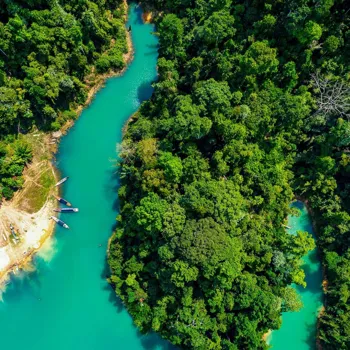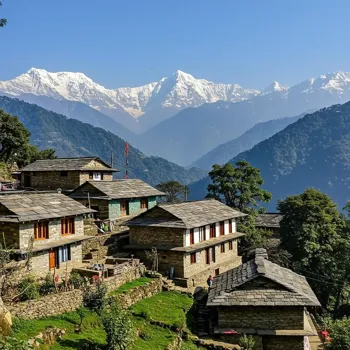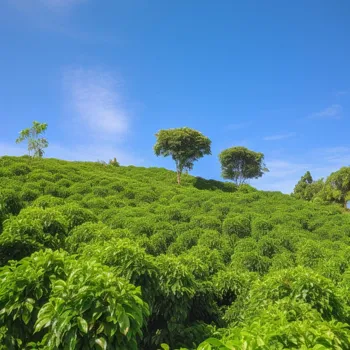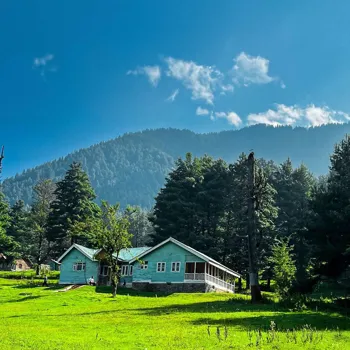Explore 2024's Top 7 Eco-Friendly Travel Destinations in India! Embrace sustainability while exploring nature responsibly
Folks, picture this: You, basking in the glory of Mother Nature, without a single
shred of guilt about harming the environment. Sounds dreamy, right? Well, wake up and smell the ethically-sourced coffee, because eco-tourism is hitting its stride in 2024, and India is leading the charge.

We're ditching the carbon footprint and embracing experiences that are not just unforgettable, but also responsible.
So, pack your bags, dust off your reusable water bottles, and get ready to explore the top 7 eco-friendly travel destinations that are turning heads and saving the planet, one mindful vacation at a time.
The shift towards sustainable travel is not merely a trend; it's a necessity.
With increasing awareness of environmental issues, travellers now want to explore the world responsibly. They actively seek destinations and experiences that minimize their impact on the environment, support local communities, and contribute to conservation efforts.
This new wave of conscious travel is changing the face of tourism, promoting a more sustainable and ethical approach to exploration. Think about visiting places where you are not just a tourist, but a responsible guest.
It's about making sure that future generations get to see the beauty and marvel of our incredible planet too.
Meghalaya: The Abode of the Clouds Calling You to Go Green
Meghalaya, literally "the abode of the clouds", is a paradise for eco-conscious travellers. This northeastern state boasts lush green landscapes, living root bridges, and some of the wettest places on earth. What makes Meghalaya truly special is its commitment to community-based tourism.

Villagers manage and maintain many of the tourist spots, ensuring that the environment benefits as much as the visitors do. Imagine trekking through dense forests, crossing those unique living root bridges (a bio-engineering marvel, mind you!), and staying in eco-friendly homestays run by locals.
You get to experience the culture firsthand, support the local economy, and breathe in that pure, unadulterated mountain air.
Places like Mawlynnong, known as Asia's cleanest village, showcase how communities can thrive through sustainable practices.
They maintain cleanliness, promote responsible waste management and focus on being organic in their farming practices. Visiting these model villages are not just trips, but learning experiences. They teach simple, yet profound lessons on co-existing with nature.
Furthermore, there are numerous trails for eco-trekking which encourages tourists to experience the natural beauty while minimizing their carbon footprint. By promoting eco-friendly options such like this, Meghalaya is not just beautiful, it is a champion of sustainability.
Kerala: Backwaters, Beaches and Eco-Conscious Bliss
Kerala, God's Own Country, has been a popular tourist destination for decades. But it's not just about swaying palms and serene backwaters anymore. Kerala is redefining its tourism sector with a strong focus on sustainability.
The state government is actively promoting eco-tourism initiatives, from responsible waste management in hotels to encouraging the use of renewable energy.
Picture yourself gliding through the backwaters on a traditional houseboat crafted from natural materials, participating in a community-based ecotourism project, or simply relaxing on a pristine beach that's regularly cleaned by dedicated volunteers.
Kerala’s eco-tourism projects aim to involve local communities and improve their quality of life, while also conserving the region's natural resources. The state's commitment to preserving its unique ecosystem is noteworthy.
This is evident in the various initiatives to protect the backwaters, promote responsible waste management, and encourage sustainable agriculture. It's not just about enjoying the beauty of Kerala, but also contributing to its preservation.
A variety of eco-friendly accommodations, that range from eco-lodges to sustainable resorts, are available offering tourists a green stay. These properties focus on environmental conservation practices reducing their impact and showcasing green hospitality at its finest.
Sikkim: Himalayan Beauty, Sustainable Practices
Sikkim, snuggled in the Himalayas, is not just visually stunning but is also India's first fully organic state. Imagine landscapes dominated by snow-capped peaks, vibrant monasteries, and serene lakes.

Sikkim is committed to preserving its natural beauty while promoting sustainable living, and they have banned plastics.
The state actively promotes eco-friendly tourism options, such as homestays in remote villages and trekking tours led by local guides who have profound knowledge of the local ecosystems.
Witness the breathtaking beauty of Kanchenjunga, learn about the rich Buddhist culture, and support the local communities, all while leaving a minimal footprint.
It showcases eco-tourism best practices.
Its dedication to organic farming isn't only a boon environmentally, but a major appeal for health-conscious travellers. Communities are actively involved in preserving cultural and natural heritage. This ensures sustainable economic growth.
Sikkim makes sure every traveler enjoys, responsibly, its beauty by promoting responsible and informed tourism. Moreover, Sikkim’s remote valleys and high-altitude trails present unique opportunities for adventure tourism and exploring ecological richness without degrading the environment.
Ladakh: High-Altitude Adventures with a Low Impact
Ladakh, the land of high passes, is famed for its beautiful landscapes. Think about stark mountains, pristine lakes, and a unique blend of Indian and Tibetan cultures. With tourism increasing, Ladakh faces significant environmental challenges from a lot of waste and overuse of resources.
However, local communities and organizations are actively working to promote sustainable tourism practices. Imagine trekking through moon-like landscapes, staying in eco-friendly guesthouses run by local families, and learning about traditional Ladakhi culture.
The focus is on responsible waste management, water conservation, and promoting the use of renewable energy sources to minimize impact.
Ladakh provides trekking tours that highlight remote corners, encouraging a low-impact experience.
Communities are being encouraged to adopt solar energy and enhance waste management infrastructure. It highlights the need for striking a balance between tourist visits, local survival, and ecosystem preservation.
Its commitment to sustainable tourism creates an example for different high-altitude locations across the world. Further promoting eco-friendly tourism here will not only safeguard Ladakhi cultural identity and environment. It can also promote more ecologically responsible adventure travel.
Coorg: Coffee, Spices, and a Commitment to Conservation
Coorg, known as the 'Scotland of India', is a haven of lush green hills, coffee plantations, and spice gardens. Located in Karnataka, Coorg is also home to a rich biodiversity and an increasing awareness of environmental concerns.

What makes Coorg an eco-friendly destination is its growing commitment to sustainable agriculture and eco-tourism.
Picture yourself strolling through aromatic coffee plantations, staying in eco-lodges that blend seamlessly with their surroundings, and learning about traditional Kodava culture from the locals.
Many resorts use solar power and promote zero waste and rely heavily on local resources to reduce dependency upon the external environment.
The local communities are also actively involved in maintaining the biodiversity and conserving the forest.
There are community based tourism options that involve treks on the local trails led by locals. They provide information on the flora and fauna of the area and their experience with nature and how to live with it in harmony. Coorg’s emphasis on its natural resources. It not just draws eco-tourists.
It provides them an opportunity to learn about eco-friendly farming, conservation, and responsible travel. It showcases how a region can promote tourism while protecting the natural beauty.
Uttarakhand: Adventure, Spirituality, and Sustainable Tourism
Uttarakhand, ‘the Land of Gods’, is a breathtakingly beautiful place with stunning mountain scenery. It attracts tourists to adventure sports and religious places. It also seeks to promote environmentally friendly tourism.

Picture yourself hiking old routes, camping in protected areas with strict rules, and seeing the region's cultural and natural history. It encourages ecologically sensitive tourism. The local communities are active in conservation efforts to preserve their surroundings.
This creates real engagement and ownership among people.
Uttarakhand also actively promotes eco-friendly lodging, small boutique hotels committed to decreasing their environmental footprint. These accommodations frequently use solar energy, and waste recycling that are environmentally friendly.
Uttarakhand demonstrates how adventure and spirituality can exist along with a solid dedication to environmental preservation. Its dedication to sustainable tourism makes sure that these beautiful landscapes are enjoyed by future generations.
It provides deep, ecologically responsible travel encounters.
Spiti Valley: A Cold Desert Oasis of Eco-Consciousness
Spiti Valley, a high-altitude cold desert mountain valley in the Himalayas, is known for its unique landscapes, ancient monasteries, and remote villages. With an increase of tourism, Spiti is dedicated to remain eco-friendly.
Envision yourself visiting ancient monasteries that mix in with rocky terrain, staying in guesthouses that local families run, and learning about Spitian culture. The major objective is responsible use of resources. This cuts down tourism's impact, which benefits both people and the environment.
Local groups actively encourage waste management and promote sustainable tourism at Spiti. Visitors are inspired to take part by decreasing waste, conserving water, and respecting local customs.
Spiti's beauty combined with its emphasis on sustainability make it a perfect spot for trips that respect nature. Sustainable methods guarantee the region's lasting appeal and ecological harmony. This enables tourists to admire its natural beauty knowingly that they are assisting it.











